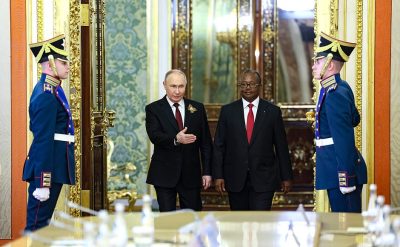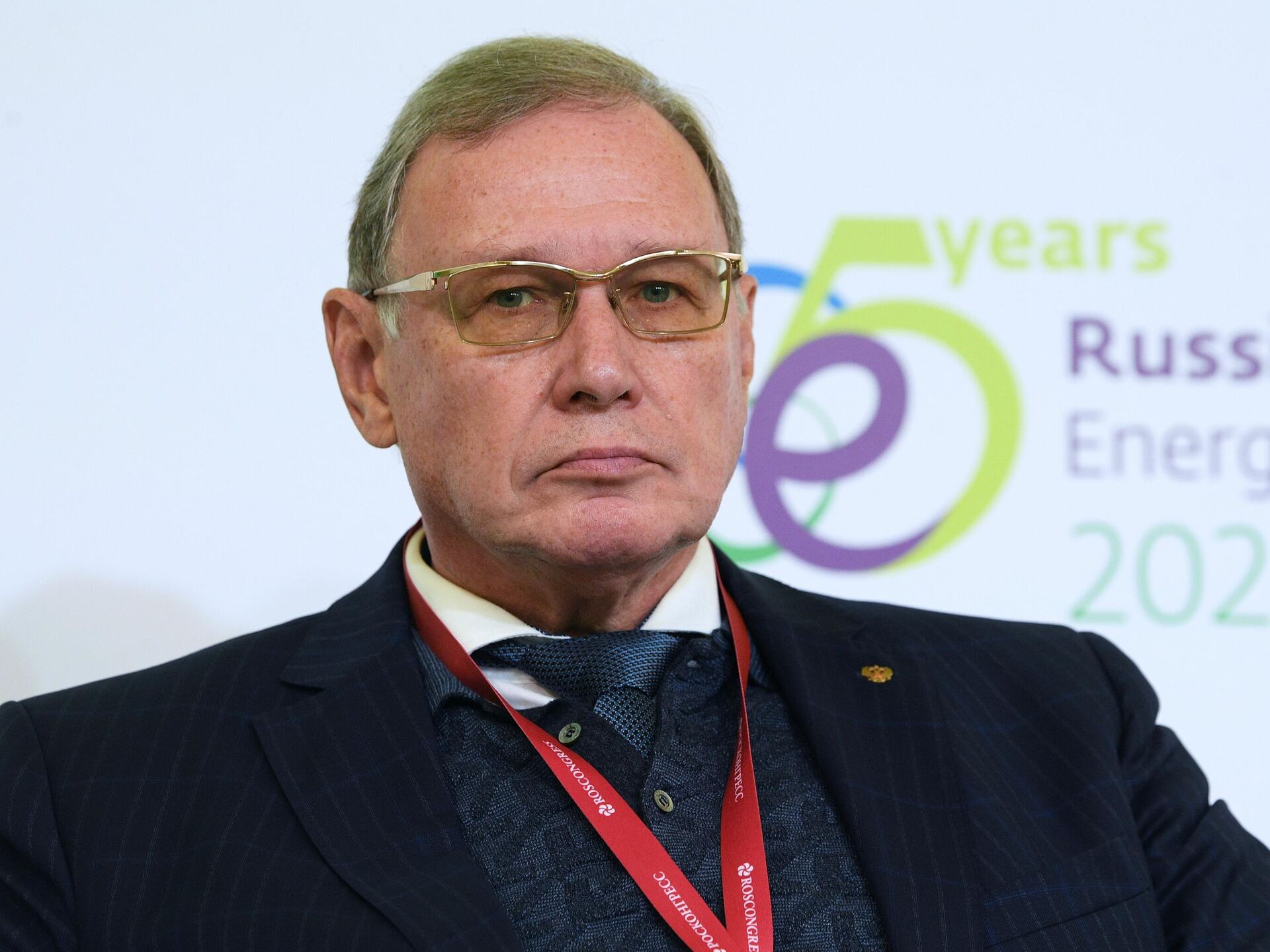French-Speaking African States Under Kremlin’s Politico-Military Influence

All Global Research articles can be read in 51 languages by activating the Translate Website button below the author’s name (only available in desktop version).
To receive Global Research’s Daily Newsletter (selected articles), click here.
Click the share button above to email/forward this article to your friends and colleagues. Follow us on Instagram and Twitter and subscribe to our Telegram Channel. Feel free to repost and share widely Global Research articles.
Global Research Wants to Hear From You!
***
Russia has noticeably intensified its diplomatic relationship with French-speaking Africa after the second Russia-Africa summit in St. Petersburg. It has focused on dealing with growing French neo-colonialism which obstructs Russia’s desire to expand geopolitical and military influence especially in West African region. The republics of Burkina Faso, Chad, Niger and Mali have established a relationship with the Kremlin, as leaders frequently shuttle between their capitals and Moscow.
Analysis indicates that Moscow’s geopolitical and military inroads is steadily gaining unshakeable grounds. It has tightened its hold across the Sahel-Saharan part of Africa and strategically extending such militarized influence towards the Gulf coastal West Africa. As well-shown, the Francophones are exhausted of France’s exploitative approach and desperately for an alternative to building a more fairer and a more mutual economic relations.
Policy experts and researchers have widely written in their published papers about
(i) Russia’s alleged involvement in the political changes in these French colonies with the fractured economy and
(ii) the fact that the region constitutes a nutritious breeding field for armed Islamic jihadist groups, demonstrates Russia’s first drastic step towards combating terrorism and ultimately penetrating into the entire G5 Sahel in West Africa.
Despite this widely published allegation of determining political directions, Moscow officially said it was rather seriously concerned about the economic under-developments and the deepening instability as well as the impoverished population in the region. Moscow has showered humanitarian assistance, described as “delivery at no-cost” and intended to ensure food security during the fourth quarter 2023, on these countries.
While updating the implications of this ‘free food’ as its strategic part of the soft-power, Burkina Faso, Chad, Niger and Mali have battered their natural resources, in exchange for creating military bases in the respective territories. Russian state-owned arms trader Rosoboronexport, as part of signed military-technical agreements, has delivered Russian-made combat and transport helicopters, armoured personnel carriers, small arms and ammunition to these Sahel-Saharan African countries, the Vedomosti newspaper reported.
Image: © Sputnik / Alexey Maishev

Oleg Ozerov, Ambassador-at-Large at the Russian Foreign Ministry, Head of the Secretariat of the Russia-Africa Partnership Forum, spoke in an interview with RIA Novosti and explicitly pointed to the fact that Russia has no military bases nor military troops in Africa.
“We don’t have a military presence there. There are appeals to the Russian side for help in ensuring security. This is not a military presence. Military presence is when troops are sent. We send instructors at the request of the African states themselves. But all this is not a military presence,” Ozerov said.
From late last year to almost half 2024, the focus has been on West Africa. The Ministry of Foreign Affairs has recieved almost ten (10) foreign ministers (including Nigeria, Gambia, Gabon, Mali and Sierra Leone) and Kremlin hosted Equatorial Guinean President Teodoro Obiang Nguema Mbasogo, then Chadian Transitional President Mahamat Idriss Deby in January, followed by Guinea-Bissau leader Umaro Sissoco Embalo. Moscow is moving further down from the Sahel-Saharan region, an elongated landlocked territory located between North Africa (Maghreb) and West Africa, to the Atlantic coast of West Africa.
On May 9, 2024, Russian President Vladimir Putin invited Guinea Bissau leader Umaro Sissoco Embalo as one of the special guests to the celebrations. It was simultaneously intended to strengthen the relationship. Umaro Sissoco Embalo was already there four times during the past couple of years since the ‘special military operation’ began, and also as part of the team to discuss peace initiatives with the Kremlin. He was at the second Russia-Africa summit held July 2023.
In a speech on that day, Putin first reminded, among other indelible facts, the successful defeat of Nazism and asserted Russia’s independence, and the support it (then Soviet Union) provided others to their anti-colonial struggles and self-determination. Putin stressed
“Africa is now building up capacity and aspires to emerging as an effective powerhouse in a multipolar world with its unique identity by making confident strides in nurturing a genuine sense of political and economic sovereignty.”
During the exclusive talks with Guinea-Bissau’s delegation, including Guinea-Bissau’s Chief of the General Staff and army generals, Putin reiterated expanding bilateral partnership in economic, scientific and technological spheres, on grounds that ties between two countries are rooted in long-standing traditions of friendship, as well as the principles of equality and mutual respect. “We have been maintaining effective inter-parliamentary and inter-agency ties too. Today, we have an opportunity to discuss our performance under bilateral agreements in various sectors and further steps to expand our cooperation. I must note that students from your country continue to study in Russia. We are ready to offer Guinea-Bissau an even bigger quota,” he told the delegation.
Russia has been paying special attention to its relations with African countries and seeking to ease their debt burden. But also for Putin, military-technical cooperation is at the prominent spot during closed-door negotiations. Russia has focused to deal with France in most Francophone countries in West Africa.
Umaro Sissoco Embalo, on his part, expressed gratitude for the support which Russia has been giving to the Government and the people of Guinea-Bissau. Over 70 percent of Guinea-Bissau’s servicemen and civilian officials were trained in the Soviet Union. This explains the necessity for the level of close interaction and cooperation with Russia.
Series of conferences and meetings proliferate these years, and Russia has a new dialogue format – the Ministerial Conference of the Russia-Africa Partnership Forum, at the level of foreign ministers. Without doubts, Russia is looking to gain political support from African countries on a number of issues, including the ‘special military operation’ in Ukraine and the sanctions against Russia. Reports indicate Moscow is seriously working on arrangements for the first meeting of this kind, which is scheduled to take place in November 2024 in Sochi. Notwithstanding that, St Petersburg’s late July Russia-Africa summit resulted in the adoption of a solid package of joint documents, including a detailed declaration and a specific plan of action until 2026.
Nonetheless, many experts say Russia has its own distinctive style and approach, set out to battle against exploitation of resources, or better still what is often phrased “the scramble for resources” in Africa.
Samir Bhattacharya, an Associate Fellow at Observer Research Foundation (ORF), where he works on geopolitics with particular reference to Africa in the changing global order, says Africa, especially the French-speaking West African countries continue to face multiple democratic challenges with a wider negative impact across the region. The narrative that depicts Russia a proactive coup advocate is compelling and seems to hold water. Russian flags being flown in the streets in West Africa. The entire region is experiencing sharp disintegration characterized by differences in political systems, economic structures and cultural norms in member countries. Unfortunately, military takeovers have become a distinctive feature (or accepted norm) of regime change in West Africa.
Bhattacharya said it would be overly generalizing to attribute the coup to neocolonialism alone. With eight coups in three years, the Sahel region in West Africa is most affected by coups. However, a close examination reveals that the Sahel Region has endured violent extremism, civil unrest, and poor governance for a very long period. It unmistakably shows how France and other Western powers are losing ground in this region. Frustration with France and other foreign powers increased fairly naturally as their military intervention failed to stem the Islamist insurgency that was spreading throughout the region.
Therefore, the West cannot address the issue merely by blaming Russia. And Russia can not blame only neocolonialism. There is fear that as many African nations continue to be beset by widespread complaints of poor governance, nepotism, and distress, many more within the region and beyond may eventually see military takeovers of a similar nature. Tracking all these bilateral developments implies that Russia’s engagement in Africa definitely requires an in-depth study, according to Bhattacharya.
In another insightful interview, Professor Sergiu Mișcoiu at the Faculty of European Studies, Babes-Bolyai University in Cluj-Napoca (Romania), where he serves as a Director of the Centre for International Cooperation and as Director of the Centre for African Studies, discusses the political situation in the French-speaking West African countries, the existing multiple challenges and Russia’s diplomacy within the context of current geopolitical changes and the scramble for influence in Africa.
Professor Sergiu Mișcoiu argued that neo-colonialism in Africa has been a growing reality after the end of the Cold War and reached a pinnacle by the early 2000s. More salient cases are the former French colonies, and Russia is focused on uprooting France out of the continent. Vladimir Putin has intended to restore the mightiness of the Soviet Union, including its influence over the African continent. But unlike the USSR, Russia didn’t and doesn’t dispose of the financial and logistic resources needed to massively invest in the key-sectors.
That compared, China has disposed of important financial resources and has been at least between the 1990s and the end of the 2010s incomparably less violent than Russia in spreading its influence all over the African continent. And China succeeded in impressing via its investments in the road and railway infrastructures, in ports, in some major public buildings and in other sectors. As compared to China, Russia made almost no difference through its modest investments and bet its entire strategy on this mixture of, on one hand, the renewal of the former USSR networks and the Soviet past, and on the other, the direct intrusion in the domestic conflicts of the most vulnerable African states.
Ultimately, African countries are bound to wake up to a common understanding of the true meaning of their colonial past for the present, and determine their own future existence. And in fact, the leaders and the elites have to engage in development decision-making processes, and at the same time have to play their roles as autonomous actors instead of being pawns in global politics.
*
Note to readers: Please click the share button above. Follow us on Instagram and Twitter and subscribe to our Telegram Channel. Feel free to repost and share widely Global Research articles.
Kester Kenn Klomegah, who worked previously with Inter Press Service (IPS), Weekly Blitz and InDepthNews, is now a regular contributor to Global Research. He researches Eurasia, Russia, Africa and BRICS. His focused interest areas include geopolitical changes, foreign relations and economic development questions relating to Africa. As a versatile researcher, he believes that everyone deserves equal access to quality and trustworthy media reports.

